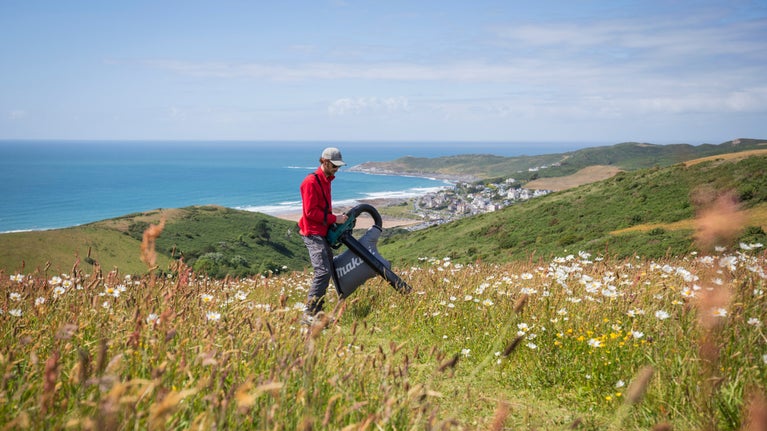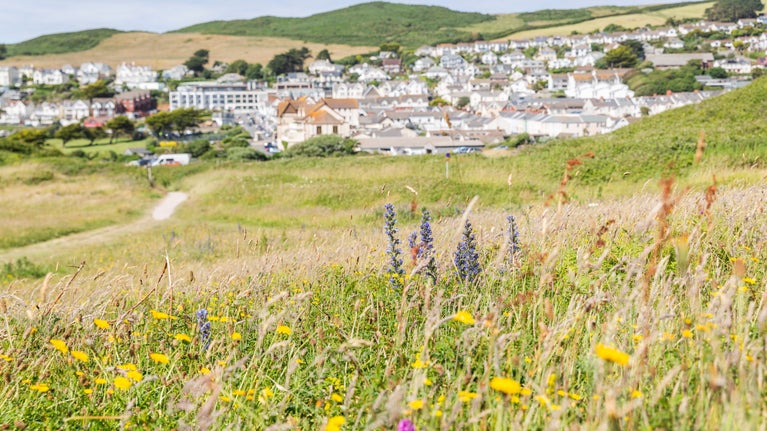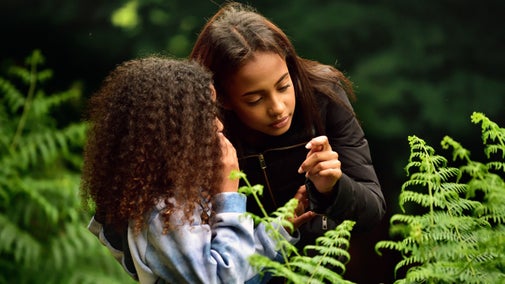
Donate
Everyone needs nature, now more than ever. Donate today and you could help people and nature to thrive at the places we care for.

The North Devon Coast was designated an Area of Outstanding Natural Beauty, now called a National Landscape, more than 60 years ago. At the heart of the National Landscape lie the sand dunes of Woolacombe, which the National Trust help to care for and conserve to this day. Find out more about how we protect these dunes while managing the land for both people and nature.
Since 2020, 136,000 trees have been planted at Woolacombe. This is a major step towards tackling the climate crisis, improving habitats and creating green spaces for people to enjoy. This ambitious project aligns with the National Trust’s broader goal of planting and establishing 20 million trees across the UK by 2030 to benefit people and nature.
A mixture of native species have been planted such as oak, birch, alder, willow, blackthorn and hawthorn. The planting of trees is important as they provide the best natural solution to lock up existing atmospheric carbon. However, other benefits which are just as important include providing crucial habitat for wildlife, helping to create a future for wildlife.
Conservation grazing involves grazing with livestock including cattle and ponies, both of which offer unique benefits to the land. By naturally grazing, the livestock break up the brambles and gorse, encouraging diverse plant growth resulting in a healthier habitat where wildflowers and insects can thrive.
In the dunes a small herd of North Devon ruby red cattle are used to maintain and build on the work being carried out. The cows keep the cleared spaces on the dunes open, by eating any new scrub that attempts to re-grow in the area. As curious animals they have no problem walking through patches of dense vegetation, ideal for clearing hard to reach patches.
The cattle are fitted with “no-fence” collars. These relatively new pieces of equipment allow the cows to be tracked using GPS and mean that we can use virtual patch margins to contain them without the use of fences. This technology allows us to graze the area without physical fences that would disrupt the landscape or limit public access.

In January 2025 work started to improve the habitat of the Woolacombe Dunes for the Brown-banded carder bee. With a good population at Braunton Burrows and occasional sightings in the Woolacombe Dunes, we hope to make the dunes a more favourable place resulting in a healthy sustainable population.
This project involves stripping thin layers of sand and turf back to create a shallow scrape in the natural dune profile which exposes the loose bare sand underneath. The bare sand will provide space for hibernating queen bees to burrow over the Winter.
Warm bare sand patches in the Spring and Summer will also be important areas for bees and other insects, snakes, and lizards to bask in, soaking up the warmth of the morning sun to raise their body temperatures for the day's activities. Over time, the scrapes will also allow delicate sand-dune wildflowers like thyme, sedum, burnet rose, lady's bedstraw, and orchids to bloom, which will provide food for the bees and for other pollinators.
Over the last century, the UK has lost 95% of its wildflower meadows. In response, the National Trust launched a project to reintroduce native grasses and wildflowers across 1,000 hectares of impoverished fields. In North Devon alone, the team has already sown over 80 hectares of meadow with wildflower seeds from local sources.
In Woolacombe we are working to restore 1,000 hectares of species-rich grassland by 2030. These meadows are a vital resource for pollinators, birds, and other wildlife, creating a diverse ecosystem where nature can flourish. Find out more about the North Devon Grasslands project here

Litter has always been a big problem on beaches and in the countryside, as it is hugely damaging to the wildlife and environment. Surprisingly little waste actually comes from visitors to the beach – the majority comes from the sea itself. Winter is often one of the worst times of year for beach litter as a lot of debris is washed up in winter storms.
The Woolacombe rangers carry out essential maintenance work and regular beach cleans and also engage with visitors and the local community to make it a communal effort to keep Woolacombe beach clean and healthy.
Monthly silent disco beach cleans are held on the last Sunday of every month, along with Plastic free Woolacombe and North Devon Silent Disco, where members of the public are invited to come along and get involved. Find out more about our beach cleans here.
With your ongoing support, we're able to continue our vital conservation work. Thank you for helping to protect these special places.

Everyone needs nature, now more than ever. Donate today and you could help people and nature to thrive at the places we care for.
From its ideal surfing conditions to its array of rock pools, Woolacombe remains one of North Devon’s best-loved beaches. Find out more about what you can see and do here.

All-terrain mobility scooters, called Trampers, allow you to enjoy a great day out at Woolacombe even if you have difficulty walking. Find out more about how to hire one.

We believe that nature, beauty and history are for everyone. That’s why we’re supporting wildlife, protecting historic sites and more. Find out about our work.

Read about our strategy, which focuses on restoring nature, ending unequal access and inspiring more people.

Newly sown wildflower grassland will connect nature habitats in the North Devon countryside. The project will see grassland cover 1,275 hectares over pockets of land across 70 miles by 2030, from Torridge to west Exmoor.